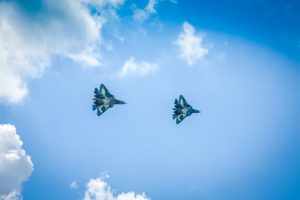
The Trump administration’s plans to restrict unarmed Russian military flights over U.S. territory for intelligence gathering were praised on Tuesday by U.S. Reps. Mac Thornberry (R-TX) and Mike Turner (R-OH).
U.S. officials announced new restrictions to unarmed Russian observation flights over U.S. territories under the Treaty on Open Skies, which has been billed by the State Department as a way to promote “openness and transparency in military forces and activities.”
Thornberry, the chairman of the House Armed Services Committee, said, “There is no good reason to allow the Russians to have nearly unfettered access to American airspace for intelligence collection.”
Thornberry’s committee heard testimony last year from multiple military officials who voiced concerns about the ability of another nation to learn about U.S. critical infrastructure using observation flights.
“My colleagues and I repeatedly raised concerns with the Obama administration and no action was taken. I am encouraged to see President Trump take a tougher stand to defend our security,” Thornberry said.
Over the summer, a Russian spy plane flew over Wright-Patterson Air Force Base in Dayton, Ohio, in the district that Turner represents.
“Allowing Russian spy planes to fly over and photograph our most sensitive military installations puts our country at risk,” said Turner, the chairman of the House Armed Services Subcommittee on Tactical Air and Land Forces. “As a member of the House Armed Services Committee, I have heard repeated, yet unsurprising, testimony confirming Russia’s abuse of the Treaty on Open Skies. I look forward to the administration stopping this practice.”
U.S. military leaders have testified to Congress about their concerns about the treaty.
Lieutenant General Vincent Stewart, director of the Defense Intelligence Agency, testified to the House Armed Services Committee in March 2016 that the “digital techniques allow Russia, in my opinion, to get incredible foundational intelligence on critical infrastructure, bases, ports, all of our facilities, so from my perspective, it gives them a significant advantage.”



